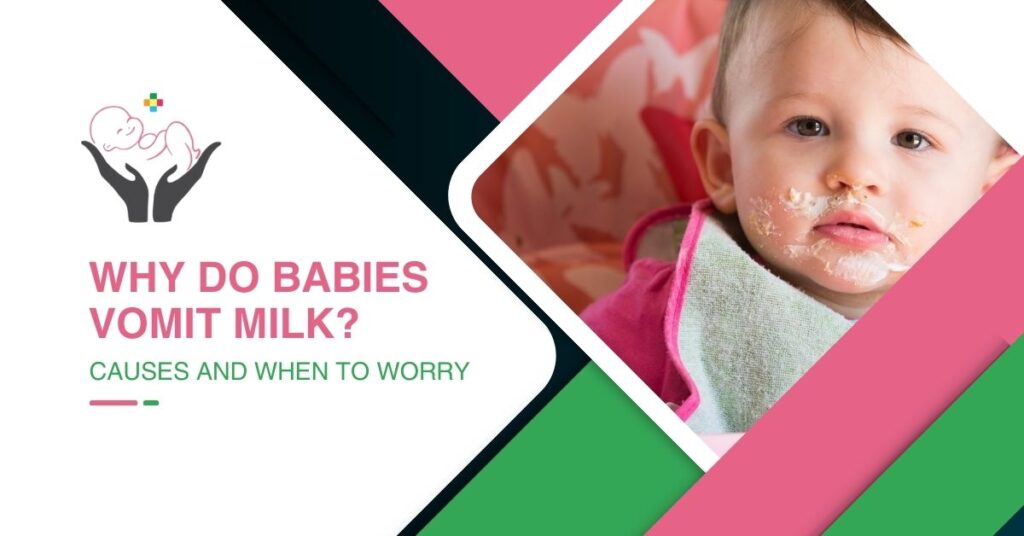Typically, seeing milk regurgitated by a newborn right after being fed is one of the troubling sights for most parents, bringing up a dawn of questions-Was the baby ill? Was I not supposed to feed it this way? Should I now take the child to the doctor? Tops are putting doubts into the minds of parents, fathers, and mothers. The truth is, a lot of times, milk vomiting in infants is a totally normal thing and is spontaneous within their developmental process. Sometimes it may point to a problem that needs medical attention.
At Pediatric New Born Clinic, we encounter lots of parents with similar worries, and we help the parents through the right counseling to distinguish when the said problem is benign and when it is something that requires the attention of a pediatrician.
Is It Normal for Babies to Vomit Milk?
Yes, it is. Quite a few infants spit up or vomit small amounts of milk after feeding. This commonly happens because of an immature digestive system. At the lower end of the food pipe is a valve that should keep food in the stomach, but in newborns, it is just not yet matured enough. Hence, if the baby burps or cries or even moves a lot after feeding, milk can easily come trickling back up.
This is very common and is often referred to as reflux or spitting up, especially in the early months of life. Most babies manage to get rid of this by the age of 12-18 months spontaneously with no treatment required.
Common Causes of Baby Vomiting Milk
Parents often assume vomiting means illness, but in infants, the causes are usually simple and harmless. The most common reasons are as followed:
1. Immature Digestive System
A baby’s stomach is still developing. The valve between the food pipe and the stomach is weak, which makes regurgitation more likely.
2. Overfeeding
Sometimes babies drink more milk than their tiny stomachs can hold. This excess often comes right back out in the form of vomiting.
3. Swallowing Air While Feeding
If a baby latches incorrectly or drinks too fast from a bottle, they may swallow air along with milk. This trapped air can cause discomfort and spitting up when the baby burps.
4. Positioning After Feeding
Lying a baby flat immediately after feeding increases the chances of vomiting. Keeping them upright for some time helps digestion.
5. Mild Reflux
Some babies experience gastroesophageal reflux (GER), where milk flows back into the food pipe. This is usually mild and improves with time.
While these causes are normal, knowing the difference between routine spit-up and something more serious is important for every parent.
When to Worry About Baby Vomiting Milk
Though most vomiting in babies is harmless, there are times when it may point to an underlying issue that requires medical attention. Parents should contact a pediatrician if they notice:
- Frequent forceful vomiting (projectile vomiting).
- Green or yellow vomit, which may suggest bile.
- Blood-stained vomit.
- Poor weight gain or weight loss despite regular feeding.
- Signs of dehydration such as fewer wet diapers, dry mouth, or unusual sleepiness.
- Constant irritability or crying after feeding.
- Vomiting begins after the age of 6 months, when reflux usually improves.
These symptoms may indicate issues such as pyloric stenosis, severe reflux, infections, or food allergies, all of which require a pediatrician’s care.
How Parents Can Help Reduce Vomiting in Babies
There are simple, safe practices that can reduce the chances of your baby vomiting milk. These are not treatments but supportive steps parents can take at home:
- Feed in smaller, more frequent amounts instead of large volumes at once.
- Always burp your baby during and after feeding.
- Hold your baby upright for 20–30 minutes after each feed.
- Avoid tight clothing that puts pressure on their stomach.
- If bottle-feeding, ensure the nipple flow is correct so the baby does not swallow excess air.
- Place the baby on their back to sleep, but not immediately after a feed.
These practices help many babies settle better and reduce spit-up. But if vomiting continues despite these measures, it’s important to visit a child specialist in Greater Noida West for proper evaluation.
Role of a Pediatrician in Managing Baby Vomiting
Parents often feel anxious when their baby vomits repeatedly. At the Pediatric New Born Clinic, our pediatricians carefully assess whether the vomiting is normal or if it indicates something that requires treatment.
The evaluation usually involves:
- Reviewing feeding patterns.
- Checking the baby’s growth and weight gain.
- Examining for signs of dehydration or discomfort.
- Identifying any reflux-related complications.
In most of the cases, reassurance and simple feeding adjustments are enough. In rare cases where medical treatment is necessary, our clinic provides specialized care customized to the baby’s needs.
Why Choose Pediatric New Born Clinic, Greater Noida?
Parents trust the Pediatric New Born Clinic because of our personalized, compassionate approach. We understand that even small concerns like baby vomiting milk can cause sleepless nights for parents. Our clinic offers:
- Experienced pediatric specialists who provide clear guidance.
- Complete growth monitoring and nutrition support.
- State-of-the-art care for newborns and infants.
- A safe, welcoming environment where parents feel supported.
By consulting a pediatrician at our clinic, parents gain the confidence that their child is receiving the right care and attention.
Conclusion
So, why do babies vomit milk? In most cases, it is a normal part of growth due to an immature digestive system, overfeeding, or simple reflux. However, parents should stay alert to signs that indicate something more serious, such as forceful or colored vomiting, dehydration, or poor weight gain.
At Pediatric New Born Clinic, we guide parents through these concerns with expert care and reassurance. If your baby’s vomiting worries you, don’t wait—consult a pediatrician and get the clarity you need.



